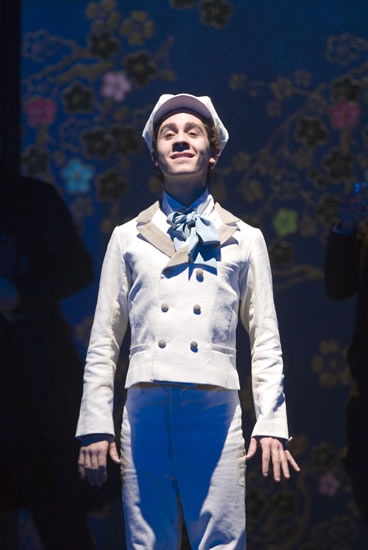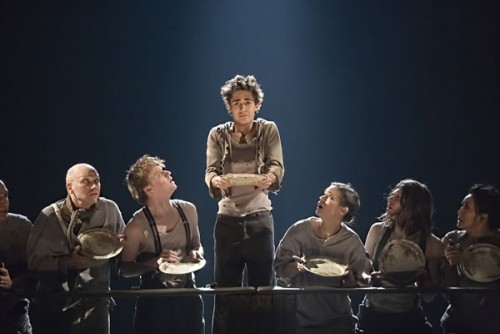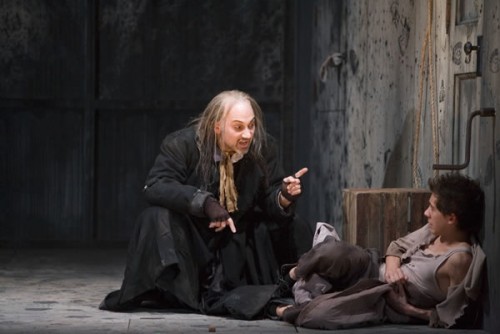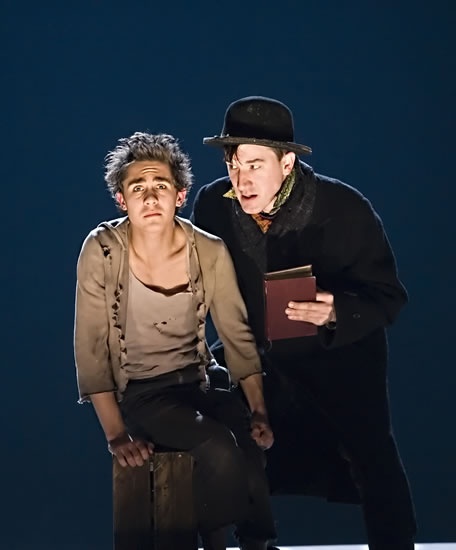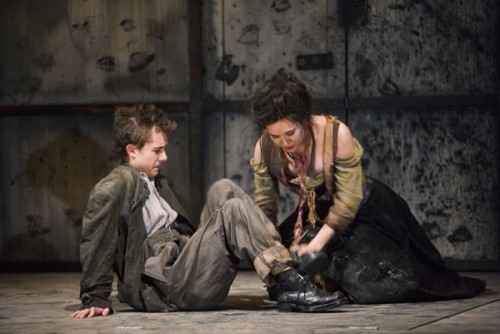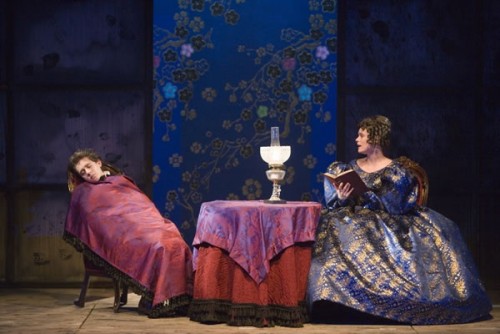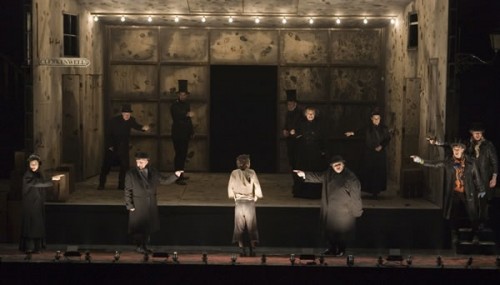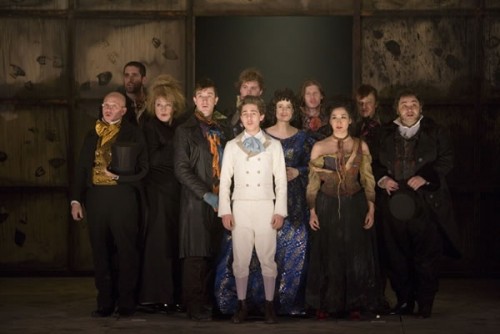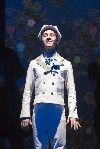Oliver Twisted by American Repertory Theatre
Neil Bartlett's Boffo Dickens Adaption
By: Charles Giuliano - Feb 22, 2007
Oliver Twist after Charles Dickens
Adopted and directed by Neil Bartlett, designed by Rae Smith, music by Gerard McBurney. Cast in order of appearance: Carson Elrod, John Dawkins/ The Artful Dodger, Michael Wartella, Oliver Twist, Remo Airalidi, Mr. Bumble, Karen MacDonald, Mrs. Bumble, Thomas Derrah, Mr. Sowerberry/ Mr. Grimwig/ Mr. Fang, Gregory Derelian, Bill Sykes/ Mrs. Sowerberry, Jennifer Ikeda, Nancy, Ned Eisenberg, Fagin, Steven Boyer, Noah Claypole/ Tom Chitling, Craig Pattison, Charley Bates, Lucas Steele, Toby Crackit, Will LeBow, Mr. Brownlow, Elizabeth Jasicki, Rose Brownlow/ Charlotte Sowerberry. American Repertory Theatre, February 17 through March 24, 64 Brattle Street, Cambridge, Mass, 617 495 2668 http://www.amrep.org
The challenge for director/ adaptor Neil Bartlett was to transform the hefty, plot thick, and character rich novel of Charles Dickens, Oliver Twist, known and beloved by all, whittle it down to two acts and two hours running time, stay true to the text and also make the serio/ comic morality tale relevant to a contemporary audience. Just how to make credible an indelible moment like the starving young Oliver daring to put out an empty bowl and plead "Please sir, a little more?"
In this hilarious and brilliant production which is destined to be the smash hit of the season for the American Repertory Theatre Bartlett manages to be absolutely faithful to the text and flavor of the sacred Dickens novel while providing a lovely, dare I say this, modern Twist. This wonderful, well paced and raucously entertaining production lets us have our cake, classic Dickens which is as familiar as the New Testament, and eat it too with wonderful, delicious, guiltless fun. It was great to leave ART, for a change, feeling thoroughly entertained and spared the usual post modernist lecture. Yes, there are those elements, the deconstructed set by Rae Smith and its clever semiotic signage which drops down and furls up periodically. But this we are inclined to accept as the state of the art in stagecraft and not as a graduate thesis in post structurality theatre. This production which was a smash hit during its run at Lyric Hammersmith in London in 2004 demonstrates that it is possible to deconstruct a classic and also provide terrific theatre. It restores our fragile faith in avant-garde theatre.
Of course any version of Oliver Twist, of which there have been many on stage and screen, lives and dies on the strength of its Fagin. But in our era of political correctness how to deal with the anti-Semitism that a broad interpretation of the character implies? The ART's Fagin is wonderfully performed by an agile, smarmy and surprisingly poignant Ned Eisenberg. He is constantly swooping about the stage descending on the innocent Oliver like the Eagle/ Jupiter sinking enormous talons into the lovely boy Ganymede. He is helped here by the swirling capes and layers of costumer Penelope Challen. Her touch is evident throughout as for example the tall Gregory Derlain whose five o'clock shadow gives a dark comic touch as he plays Mrs. Sowerberry in outrageous drag, a la Monty Python. The British seem to just love nutty transvestites.
Where Fagin often gets a racist prosthetic proboscis here there is none of that. As played by Eisenberg under Bartlett's masterful direction he has been dejewified so to speak. He is less of the Tribe of Israel, as he was viewed during the time of Dickens, and more here of the Tribe of Thieves. He and his disciples like the perennially wonderful Artful Dodger, nicely rendered by Carson Elrod, just want to make a decent if dishonest living. When Oliver twists away from Fagin's grasp, forgive me I can't help myself, and finds a loving home with Mr. Brownlow (the able Will LeBow) he is asked by an underling why he can't just settle for another of the many lost boys of Covent Garden. Fagin's reply is that the faces of those boys betray them in an instant. Oliver has that je ne sais quois which Fagin identifies as his "hundred pound" meal ticket. With proper training in the dark arts Oliver has endless potential until the inevitable end of the criminals of the time of Dickens, the gallows, or a one way ticket to Australia. In this interpretation we truly care and feel for Fagin who with some bad luck provided by the dark and brutal Bill Sykes (Gregory Derelian) is condemned to death. There is a strong and touching final confrontation between Fagin and Oliver his innocent nemesis. The twist of fate, there I go again, is that this production makes us feel that it is really Fagin who got screwed by the goody goody Oliver who gets to live happily ever after with his boring new family. Hey, it was a lot more fun to pick pockets with Fagin and his gang. Really nothing is worse that to lead the life of the British bourgeois. Boring. Which is precisely why Dickens' underworld characters are always so richly entertaining. Shaw's Eliza Doolittle is far more interesting selling flowers as a cockney guttersnipe than being passed off as a princess at the ball under the tutelage of the uptight pedant Professor Higgins. Were it not for its poor the British would be the most boring people on earth.
And, of course, what is Oliver Twist without Oliver Twist? Here the ART has cast a very good juvenile lead in the abundantly talented Michael Wartella. Under the direction of Bartlett it proves to be a very physical role. He is bounced about a lot. He is always getting up and lying down and getting tossed like a rag doll. Wartella brings this off quite nicely. But he is more convincing as the scruffy Oliver of the Poor House than when later cleaned up as bright as a penny. He is better as the scamp than choir boy. The innocence that is so prized by Fagin is a bit difficult to imagine in this tough and resilient Oliver.
There is a lot of care given in this production to the lesser characters and details. The device of turning the actors into a chorus is brilliant. They open and close the play and seem to step out of context and reflect back on the notion of theatre, literature and artful deception. This is conveyed by Elrod who slips back and forth between the role of the narrator reading from and commenting on the Dickens text and then jumping back into the Artful Dodger. By this device Bartlett allows for viewing the play from multi levels including detachment and irony. Bartlett pops us in and out of the play with nice precision. It also conflates with our own detached, received knowledge of the plot and characters which preceded and coincides with its theatrical presentation. So he allows for positioning the audience in several simultaneous places. We become characters in a Pirandello farce.
A great pleasure of following and knowing a repertory company such as ART is to see what it does with its familiar actors. The program notes inform us that Mr. Bumble is the 60th ART role for the genius of Remo Airaldi. Given his enormous girth relative to modest height it is always fascinating to see just how a new play uses the strengths and limits of his physical presence and considerable skills. Over the years he has been a phenomenal asset of the company. Here his Mr. Bumble is deliciously silly and nicely balanced with an equally terrific nasty, old bitch, Mrs. Bumble, Karen MacDonald, who proves to have one of the strongest signing voices in the ensemble.
Just a comment on the superb music of Gerald McBurney. The chorus work was a great embellishment of this production. The lyrics are clever, insightful and sharply executed. The trio of instruments: violin, hurdy gurdy and some medieval looking wind instrument seemed ever so scruffy and just right for the period and class. It was Dickensian street music and what a feat to bring off with such authenticity.
Most importantly this evening of theatre created a craving to get back to the source. How we all long to have the time and leisure to read through Dickens. I am saving that project for next year when I am at last retired. I can't wait. But perhaps ending a review on that note seems, well, a little twisted.

